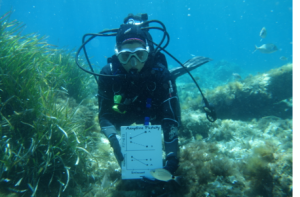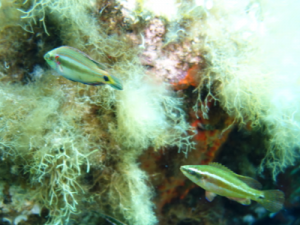Linking social interactions and sexual selection


A fundamental question across behavioral disciplines is: What are the causes and consequences of variation in social behavior? Extensive research has asked why beneficial interactions (such as cooperation) or antagonistic interactions (such as conflict) arise. Yet, cooperation and conflict don’t occur in isolation from one another. Instead most social interactions involve a combination of cooperation and conflict simultaneously (Alonzo 2010). Our research has asked how social interactions affect the strength and direction of sexual selection. We are also studying how and why individuals change between cooperative and antagonistic behaviors and what consequences this individual plasticity and behavioral variation has on social interactions using a combination of evolutionary theory and empirical work on the ocellated wrasse.
Want to know more? See the papers below (or a complete list HERE)
Stiver KA+, Alonzo SH. 2013 Does the risk of sperm competition help explain cooperation between reproductive competitors? A study in the ocellated wrasse (Symphodus ocellatus). American Naturalist 181(3): 357–368 (http://dx.doi.org/10.1086/669149)
Kazancıoğlu E*, Klug H+, Alonzo SH. 2012. The evolution of social interactions changes predictions about interacting phenotypes. Evolution 66(7):2056–2064 (http://dx.doi.org/10.1111/j.1558-5646.2012.01585.x)
Alonzo SH. 2008. Female mate choice copying affects sexual selection in wild populations of the ocellated wrasse. Animal Behaviour 75(5): 1715-1723 (http://dx.doi.org/10.1016/j.anbehav.2007.09.031)
Alonzo SH. 2007. Conflict between the sexes and cooperation within a sex can alter classic predictions of mating systems theory. Evolutionary Ecology Research 9:145-156 (http://www.evolutionary-ecology.com/issues/v09n01/kkar2008.pdf)
Sinervo B, Chaine A, Clobert J, Calsbeek R, Hazard L, Lancaster L, McAdam AG, Alonzo SH, Corrigan G, Hochberg ME. 2006. Self-recognition, color signals, and cycles of greenbeard mutualism and altruism. PNAS USA 103(19):7372-7377 (http://dx.doi.org/10.1073/pnas.0510260103)